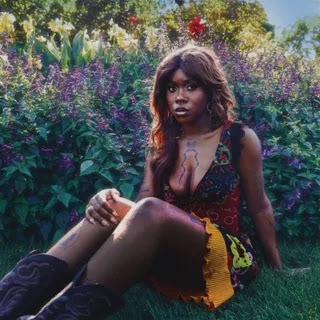On her brutally honest debut album, the Chicago singer-songwriter takes folk music and bends it to her will, exploring agony and adoration in equal measure.
Kara Jackson doesn’t just wear her heart on her sleeve, she offers it to you in her palms after cutting it from her chest. In the music video for “no fun/party,” the lead single to her debut record, Why Does the Earth Give Us People To Love?, the 23-year-old Chicago native and former National Youth Poet Laureate straddles a double of herself and pulls the organ from the doppelganger’s body. “Isn’t that just love?” she sings ironically, placing her heart, still slick with blood, delicately on a table of makeshift wires. It’s a striking visual that speaks to Jackson’s commitment to painful vulnerability, her recognition that agony and adoration must stem from the same source.
That love and suffering often go hand in hand is conventional wisdom by now, and one that Jackson herself tackled in her 2019 EP, A Song for Every Chamber of the Heart. On her latest record, the singer-songwriter has both refined her musical capabilities and pushed her existential questions into rockier terrain. Why Does the Earth Give Us People to Love? is an album about love, certainly, but none of its tracks are love songs. The music is neither sweet nor loving; many of the songs are harsh and disorienting, probing and uncomfortable. Where others might posit that it’s better to have loved and lost, Jackson argues that love is loss.
Her storytelling is masterful, filled with earnest lyricism and a knack for arresting imagery. On “no fun/party,” she describes the banality and repetition of finding the one: “It’s hard to have patience when you’re waiting on luck, like a postal truck, like a postal truck…” Jackson also flexes her wide vocal range to drive home the emotions behind her words. “Don’t you bother me,” she warns her ex-lover on the meditative, breakup ballad “Free,” the deep rumbling of her voice adding a menacing edge. On the title track, Jackson pitches her voice high and childlike, almost as though her philosophical questioning—“Why does the earth give us people to love then take them away from our reach?”—soars toward the heavens.
Jackson is a guitarist whose instrument functions not as an appendage to her words, but the very skin that holds her music together. On “no fun/party,” she rarely deviates from a five-note lick which cradles her lyrics and maintains the song’s pensive undertones. These songs introduce lusher arrangements—piano, banjo, xylophone—and a few hometown guests—KAINA, NNAMDÏ, Sen Morimoto—into her repertoire, which let her melodies shift and meander; just when you think you’ve grasped one, it wiggles out of your fist. On the outstanding “Dickhead Blues,” her lackadaisical guitar changes shape when layered with frenetic drums and then disappears altogether, drowned by the layered voices of a choir.
In the title song, Jackson mourns her friend Maya, who died from cancer in 2016. Over the most ominous arrangement on the record,, she asks why she was gifted a beautiful friendship if it was only meant to be taken from her. “We’re only waiting our turn, call that living,” she laments. Death is a constant specter in Jackson’s work—“lotta people gonna die,” she bellows on “recognized” and its reprise—but her grief is not only for the loss of life. She is also mourning relationships that died mid-course, or perhaps killed her spirit. She sings of a lover who forced her to be their therapist, of someone who made her feel cheap and used, of an ex who was generally just kind of a dick.
The cost of love comes up repeatedly on Why Does the Earth, and it’s never clear if it’s one Jackson feels is worth paying. “Have you thought about the price of my mouth?” she asks her lover cheekily on “Free.” On “Rat,” Jackson sings of a man who “couldn’t buy compassion cause it’d cost him 40 dollars.” “Price,” “cost,” “bargain,” “pay”; her frustration with transactional relationships is palpable, as is her desire to devote herself to someone without giving away parts of herself. The record captures the dangers of living with an open heart at a time of diminished personal connection, massive overwork, incessant productivity, and constant grief: To prioritize love one must give up something else.
But real love is never free. bell hooks said it best in her landmark 1999 text, All About Love: “To be loving is to be open to grief. To be touched by sorrow, even sorrow that is unending. The way we grieve is informed by whether we know love.” Throughout these 13 songs, Jackson never answers the question she poses in the album’s title. But she does have some breakthroughs. At the end of “Dickhead Blues,” as she finishes recounting her tumultuous love affair, she affirms the value in herself in a way her partner never could. “I am pretty top notch, I’m useful!” Jackson cries, her layered falsetto drifting into the ether. Though much of the loss that accompanies love is outside of our control, there is one thing Jackson’s certain of: She will not lose herself.



0 comments:
Post a Comment